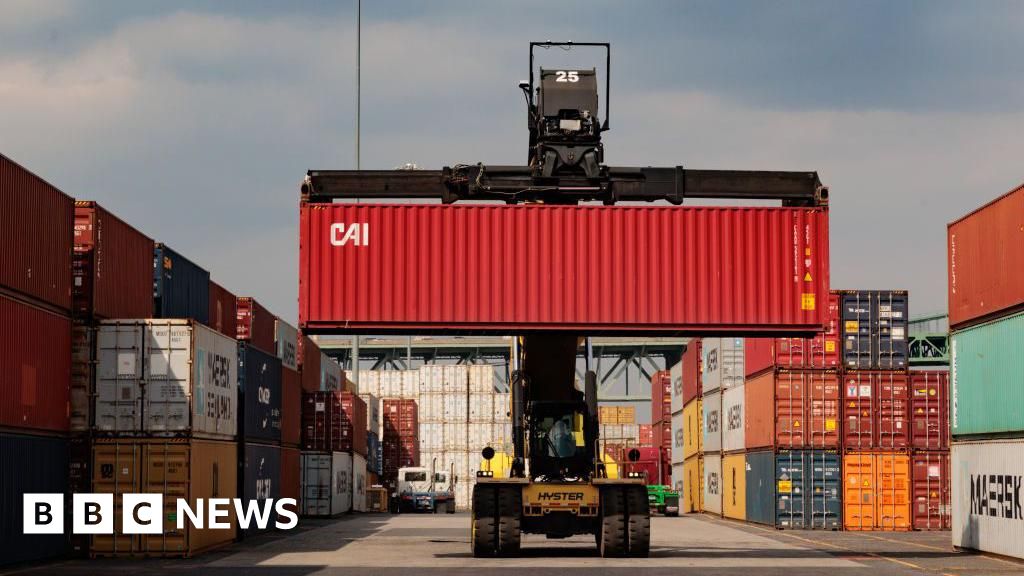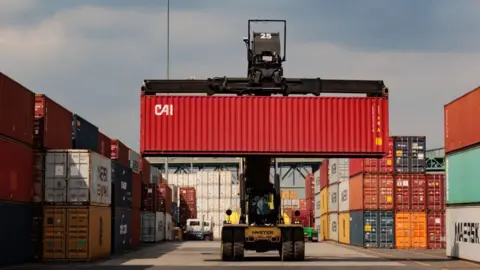

Getty Images
President Donald Trump is intensifying efforts to target exports from nations he deems to have unfair trade practices against the United States.
On Thursday, he issued a memo directing his team to establish customized tariffs for individual countries, taking into account variables such as current tariffs, exchange rates, trade balances, and various regulations.
The White House expressed that issues arising from tariffs imposed by other nations were only part of the problem, highlighting specific policies within the European Union that disadvantage American exporters.
Though significant questions linger regarding these plans, the announcement is anticipated to spark global trade discussions.
Countries That May Be Affected
The memorandum signed by Trump requires his team to present a plan for “reciprocal trade and tariffs” within six months.
Howard Lutnick, Trump’s nominee for Commerce Secretary, indicated that his team plan to submit their strategy by April 1st.
Trump characterized the proposal for reciprocal tariffs as a means to attract investment and enhance manufacturing in the United States.
According to Trump, “If you manufacture your product within the US, there will be no tariffs,” as he emphasized his commitment to fairness.
He stated, “In virtually all instances, other nations charge us significantly more than we charge them, but those days are over.” He felt that this should have been addressed long ago.
In addition to the European Union, Trump’s proposals are expected to affect trade relations with countries like India, Vietnam, and Thailand, where tariffs tend to be higher and the US is a major destination for their exports.
Trump signed the memo ahead of discussions with Indian Prime Minister Narendra Modi, who has previously begun to reduce tariffs on key products like motorcycles, a topic Trump had raised during his first term.
Nevertheless, he committed to impose reciprocal tariffs on Indian goods during a joint press event with Modi, asserting, “Whatever India charges us, we charge them.”
Recently, officials from Thailand and Vietnam also indicated they are reassessing their trading terms with the US.
Before Trump’s announcement, the European Union affirmed its dedication to “maintaining a strong partnership with the US.” Olof Gill, the commission’s trade spokesperson, mentioned, “We will continue to pursue constructive engagement while being prepared to safeguard our interests.”
Understanding Reciprocal Tariffs
A tariff is a tax levied on imported goods, payable by the company responsible for bringing the product into a country.
Nations generally implement tariffs to shield domestic industries from foreign competition.
Historically, the US has advocated for free trade and maintained a low average tariff rate, aside from certain goods such as footwear and, more recently, steel and aluminum.
According to the WTO, the US currently has an average tariff rate of 3.4%, while the average in Europe is 5%.
In its proposals, the White House noted concerns about tariffs like the 10% tax applied to US-made vehicles in Europe compared to the 2.5% tariff on imports into the US.
Additionally, the White House pointed out that Brazil imposes an 18% tariff on ethanol imports, whereas the US charges only 2.5% for the same product.
Officials made clear that the US plans to use tariffs to address broader policy issues, highlighting worries about digital service taxes enacted by various countries, including Canada and the UK, affecting US tech companies, as well as Europe’s VAT regulations.
Duncan Edwards, CEO of BritishAmerican Business, stated Trump’s tariffs “should not come as a surprise,” emphasizing that the mechanics of any reciprocal tariffs will be a significant area of focus.
He added, “We hope that the UK’s relatively open market and balanced trade relationship with the US might mitigate some of the impact of this policy, but we shouldn’t take anything for granted.”
Potential Economic Implications of Tariffs
Thursday’s announcement follows a series of tariff-related actions by the new administration.
Earlier this week, Trump mandated a 25% import tax on steel and aluminum imports, ending prior exemptions for the EU, UK, and Brazil, which will take effect next month.
He has also increased tariffs on all goods from China to 10% and threatened to impose duties of 25% on imports from Canada and Mexico, a proposal currently paused until March.
Wall Street shares increased following the absence of any immediate tariff announcements.
John Cassidy, CEO of Red Cedar Investment Management, remarked that Trump’s rapid succession of tariff announcements has created uncertainty on Wall Street, which typically dislikes unpredictability.
Still, he cautioned against overreacting, noting that the tariffs imposed during Trump’s first term did not have a profound effect on the US economy.
“I believe Trump is strategically navigating this situation and possesses significant leverage,” he said.
However, Alex Durante, an economist at the Tax Foundation, remarked that the future effects of Trump’s actions remain uncertain.
He expressed skepticism toward tariffs as an effective stance for addressing trade grievances due to their potential to increase costs and introduce uncertainty for US firms, along with risks of retaliation.
“I think we are progressively heading towards more tariffs each week, which raises the risk of escalating a trade war with other countries,” he noted.
He also mentioned that Trump abandoned the Trans-Pacific Partnership during his first term, which had aimed to resolve similar issues with Asian countries.
“They were amenable to addressing these matters without plunging the US into further trade unpredictability,” he remarked.
Trump has downplayed fears related to potential economic repercussions, asserting that his strategy will eventually promote US manufacturing growth.
He stated, “Job availability will increase. Prices may rise initially, but they could also decrease.”
However, surveys indicate that the public is worried about living costs and remain unconvinced of the benefits of tariffs, which economists warn could likely lead to higher expenses for US businesses and consumers.
A recent poll from Marquette Law School revealed that merely 24% of participants believe tariffs would benefit the US economy, including less than half of Republicans, just 12% of independents, and 4% of Democrats.
Charles Franklin, the poll’s director, posed the question of whether tariffs would lead to increased inflation and higher product costs, asserting that while the fairness argument may resonate, the impact on prices is a more challenging narrative to convey.
Reporting contributed by Tom Espiner










